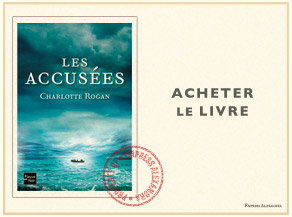Below is an excerpt from the interview. You can read the full article here.
How far would you go to save your own life? That’s the burning question at the heart of Charlotte Rogan’s début novel The Lifeboat (Virago, March). Set in 1914, 22-year-old Grace Winter has just survived three perilous weeks on the open sea in a lifeboat. Grace and her wealthy new husband were honeymooning on a luxurious Atlantic ocean linerwhen an explosion forced everyone to abandon ship. At the beginning of the novel Grace is about to go on trial for her life following the events of those three weeks in the lifeboat. Quite how she managed to survive on the overcrowded lifeboat, when so many of her fellow passengers did not, is revealed over the course of the novel.
“It’s a psychological exploration of the will to survive,” says Rogan, over the telephone from her home in Connecticut. As Grace narrates her story it becomes apparent her memory of events may be flawed, to say the least, and the truth of what actually happened remains hazy. There are tiny clues throughout The Lifeboat that things may not have been exactly as Grace chooses to remember, and this uncertainty is likely to provoke heated discussion within reading groups.


